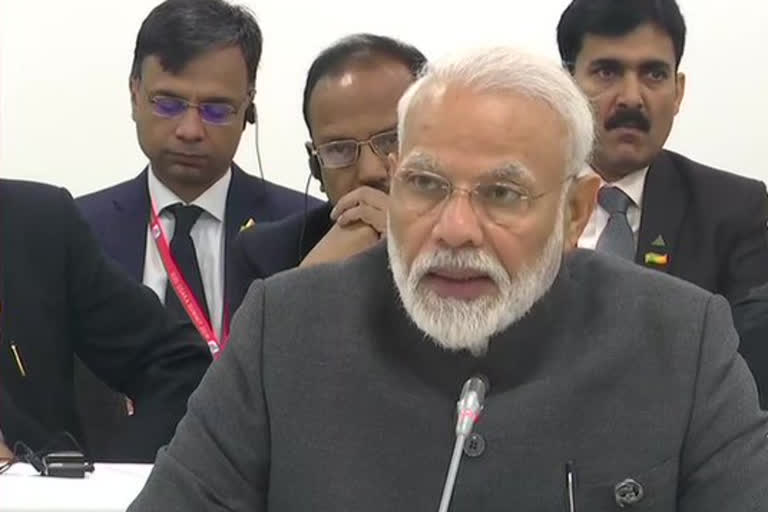New Delhi: Prime Minister Narendra Modi will be holding talks with Chinese President Xi Jinping later tonight along the sidelines of the 11th BRICS (Brazil Russia India-China-South Africa) summit meeting. The meeting comes a little more than a week after India walked out of the proposed mega-regional trading bloc RCEP (Regional Comprehensive Economic Partnership) and a month since the two top leaders met for their second informal summit in Mamallapuram.
The domestic industry in India has strongly opposed RCEP arguing that the country would turn into a dumping ground for Chinese goods coming in through third countries. India has a 50 billion USD trade deficit favouring China and a ministerial group that was agreed upon in Tamil Nadu headed by finance minister Nirmala Sitharaman and Chinese Vice Premier Hu Chunhua is expected to meet soon to discuss trade and investments and deficit reduction ways.
While in Brasilia, PM Modi will have Kashmir on his mind. Though Kashmir was not raised during the second informal summit in Tamil Nadu, the Chinese support at the Security Council to its friend Pakistan to internationalize the issue remains a major thorn in ties. Meanwhile adding to the woes a second US Congressional hearing has been lined up for 14 November on Kashmir post the abrogation of Article 370 and reorganization of the state into Union Territory. The Tom Lantos Human Rights Commission will hold a hearing on 14 November, 2 pm local time to ‘examine the human rights situation in the former state of Jammu and Kashmir in India in historical and national context’. The committee set up by the family of Lantos after his death is led by Democrat Jim McGovern and Republican Chris Smith. In 2014 and 2015 previously, this particulate Commission in critical hearings heard depositions on the plight of religious minorities in India.
“The Indian government’s decision to change the legal status of the Muslim-majority state of Jammu and Kashmir, announced in August and effective as of October 31, 2019, has attracted intense attention due to persistent reports of human rights violations, including a crackdown on freedom of expression; the arbitrary preventive detention of hundreds of politicians, lawyers, journalists, and other civil society figures and related fears of enforced disappearance; and the use of excessive force against protesters. The increased militarization of the security presence in the region and the economic and social consequences of the central government’s actions including continuing restrictions on the internet and phones have also provoked widespread concern. Besides, militants have targeted migrant workers from outsider Kashmir, and have threatened businesses to maintain a protest shutdown,” said a formal announcement. “Witnesses will examine the human rights situation in Jammu and Kashmir in the context of the region’s history and larger patterns of rights violations in India and Pakistan, and will offer recommendations for action by Congress,” the press statement added.
This Congressional hearing comes nearly three weeks after the US House Foreign Affairs Sub Committee scathing hearing on Kashmir where lawmakers sought an ‘active US role’ in defusing the ‘humanitarian crisis’ in Jammu and Kashmir.
Modi To Meet Putin Today, Terrorism Key In BRICS
Ahead of his meeting with Xi, PM Modi will hold bilateral talks with Russian President Vladimir Putin and Brazilian President Jair Messias Bolsonaro. Modi and Putin’s meeting comes at a time when Turkish President Erdogan is heading to the US amid tensions between the NATO allies over the situation in Syria as well as Ankara’s purchase of S-400 Russian missile defence system. India which has purchased S400s from Moscow is watching the CAATSA sanctions shadow over Turkey closely.
Since 2014 this is the sixth BRICS Summit that PM Modi is attending. This year’s summit theme is "Economic Growth for an Innovative Future.” The five major emerging economies in BRICS comprise 42 per cent of the world's population representing 23 per cent of the global GDP and around 17 per cent of world trade. On the morning of 14th November, after the photo-op, the BRICS leaders will attend a BRICS restricted closed session. The session is likely to focus on ‘challenges and opportunities for the exercise of national sovereignty in the contemporary world’ said an Indian official. This will be followed by the BRICS Plenary Session where the leaders will discuss the intra-BRICS cooperation for the economic development of BRICS societies a then meeting with BRICS Business Council will take place. After the summit, the leaders will issue a joint declaration.
“We have also worked closely within BRICS to not only take a strong stand against terrorism but also work to bring about focused consultations on specific aspects related to terrorism. This year the joint working group on counter-terrorism has decided to constitute five sub-working groups on counterterrorism in the following areas. Terrorist financing, use of the Internet for terrorist purposes, countering radicalization, issue of foreign terrorist fighters and capacity-building. It is expected that India will chair the subgroup on use of the internet for terrorist purposes,” said T S Tirumurti, Secretary (Economic Relations) in MEA ahead of the visit. During the meetings of the National Security Advisors of BRICS last month, Ajit Doval had proposed to host a BRICS workshop on digital forensics in India.



